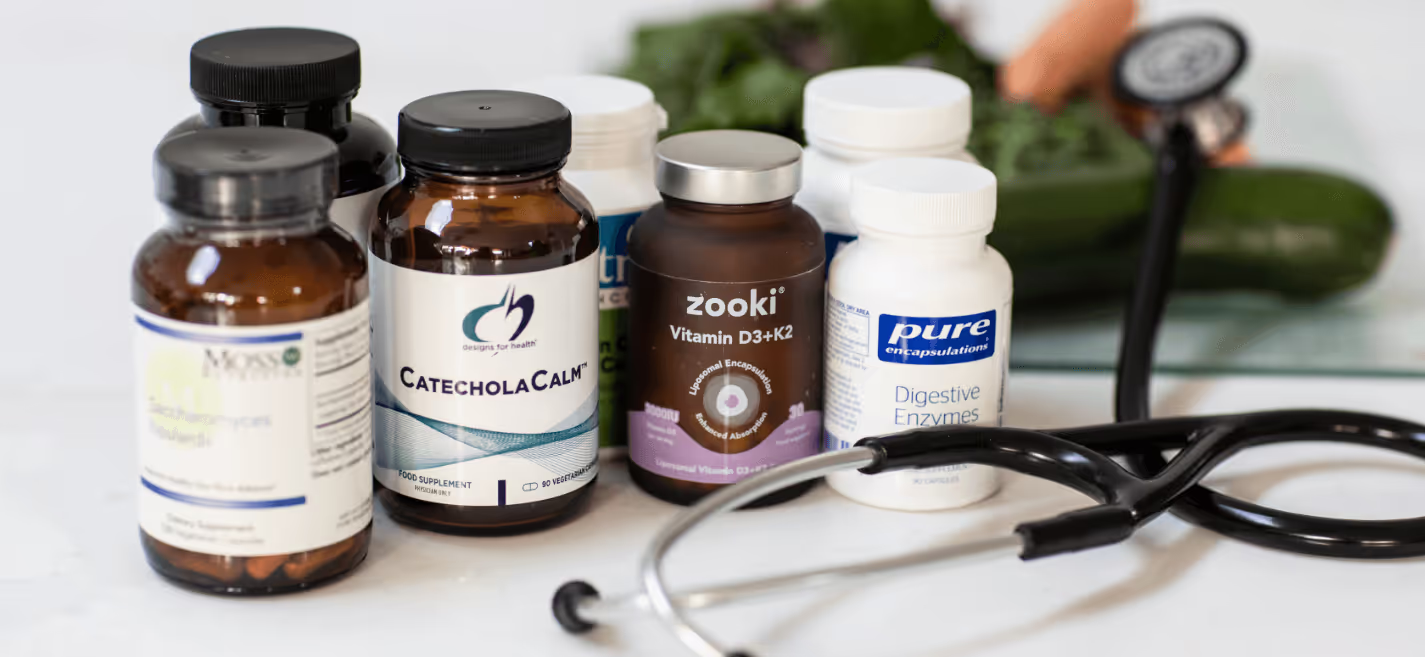
knowledge base: the blog
Natural Remedies for Hormone Imbalances


by Dr Nirusha Kumaran
October 10, 2025
Natural Remedies for Hormone Imbalances
Hormone imbalances can significantly impact an individual's quality of life, causing a range of symptoms from mood swings and fatigue to weight gain and skin issues Aarshageetha et al., 2024. While conventional treatments are often effective, many people seek natural remedies to alleviate their symptoms. This section will explore the best natural remedies for hormone imbalances, backed by scientific evidence.
Dietary Interventions
Diet plays a crucial role in maintaining hormonal balance. Certain foods and nutrients can help alleviate symptoms of hormone imbalances, while others can exacerbate them. For example, foods high in phytoestrogens, such as soy and flaxseeds, may help reduce symptoms of menopause Echeverria et al., 2021. On the other hand, a diet high in processed foods and sugar can disrupt hormonal balance Pandozzi et al., 2022.
Herbal Remedies
Several herbal remedies have been shown to have a positive impact on hormone imbalances. For instance, black cohosh has been found to reduce symptoms of menopause, including hot flashes and night sweats Pandozzi et al., 2022. Other herbal remedies, such as maca and ashwagandha, may help balance cortisol levels and alleviate symptoms of adrenal fatigue Ajdžanović et al., 2021.
Supplements
Certain supplements, such as omega-3 fatty acids and probiotics, can also help alleviate symptoms of hormone imbalances. Omega-3 fatty acids have anti-inflammatory properties, which can help reduce inflammation and promote hormonal balance Park et al., 2022. Probiotics, on the other hand, can help regulate the gut microbiome, which is essential for hormonal balance Fasero et al., 2023.
Lifestyle Modifications
In addition to dietary interventions, herbal remedies, and supplements, lifestyle modifications can also play a crucial role in alleviating symptoms of hormone imbalances. Stress management techniques, such as yoga and meditation, can help reduce cortisol levels and promote hormonal balance K Hadeler & D Maderal, 2020. Regular exercise, such as walking and weightlifting, can also help regulate hormonal balance and reduce symptoms of hormone imbalances C Friedman et al., 2023.
Phytotherapy
Phytotherapy, the use of plant extracts to treat medical conditions, has been shown to be effective in alleviating symptoms of hormone imbalances. For example, a study found that a phytotherapeutic approach using soy isoflavones reduced symptoms of menopause in postmenopausal women Ajdžanović et al., 2021.
Conclusion
Natural remedies, including dietary interventions, herbal remedies, supplements, lifestyle modifications, and phytotherapy, can be effective in alleviating symptoms of hormone imbalances. While these remedies may not replace conventional treatments, they can be used in conjunction with them to promote hormonal balance and overall health. It is essential to consult with a healthcare professional before starting any new supplements or herbal remedies, especially if you are already taking medication or have a underlying medical condition.
Key Points
- Dietary interventions, such as a diet high in phytoestrogens, can help alleviate symptoms of hormone imbalances Echeverria et al., 2021.
- Herbal remedies, such as black cohosh and maca, may help balance cortisol levels and alleviate symptoms of adrenal fatigue Pandozzi et al., 2022, Ajdžanović et al., 2021.
- Supplements, such as omega-3 fatty acids and probiotics, can help reduce inflammation and promote hormonal balance Park et al., 2022, Fasero et al., 2023.
- Lifestyle modifications, such as stress management techniques and regular exercise, can help regulate hormonal balance and reduce symptoms of hormone imbalances K Hadeler & D Maderal, 2020, C Friedman et al., 2023.
- Phytotherapy, the use of plant extracts to treat medical conditions, has been shown to be effective in alleviating symptoms of hormone imbalances Ajdžanović et al., 2021.
References
Cited References:
Aarshageetha, P., P R Rani Janci, P., & Devi Tharani, N. (2024). Role of alternate therapies to improve the quality of life in menopausal women: a systematic review.. Journal Of Mid-life Health. https://doi.org/10.4103/jmh.jmh_222_22
Echeverria, V., Echeverria, F., E Barreto, G., Echeverría, J., & Mendoza, C. (2021). Estrogenic plants: to prevent neurodegeneration and memory loss and other symptoms in women after menopause.. Frontiers In Pharmacology. https://doi.org/10.3389/fphar.2021.644103
Pandozzi, C., Giannetta, E., & G Tarsitano, M. (2022). Phytotherapic approach in menopause: light and darkness.. Minerva Endocrinology. https://doi.org/10.23736/S2724-6507.22.03712-5
Ajdžanović, V., Miler, M., Šošić-Jurjević, B., Filipović, B., Milenkovic, D., Jakovljević, V., & Milošević, V. (2021). Soy isoflavone-caused shunting of the corticosteroidogenesis pathways in andropausal subjects: top-down impulse for the optimal supplementation design.. Medical Hypotheses. https://doi.org/10.1016/j.mehy.2021.110516
Park, S., Zhang, T., Yue, Y., Jeong, S., Ryu, M., Wu, X., Yang, H., & Jeong, D. (2022). Alleviation of metabolic disturbance by substituting kanjang high in bacillus for salt through modulation of gut microbiota in estrogen-deficient rats.. Foods (Basel, Switzerland). https://doi.org/10.3390/foods11131951
Fasero, M., Quereda, F., Andraca, L., & J Coronado, P. (2023). Pharmacological interactions and menopausal hormone therapy: a review.. Menopause (New York, N.Y.). https://doi.org/10.1097/GME.0000000000002219
K Hadeler, E. & D Maderal, A. (2020). Drug interactions of natural supplements in dermatology: a review.. International Journal Of Dermatology. https://doi.org/10.1111/ijd.15389
C Friedman, J., Sheeder, J., Joel Polotsky, A., & Lazorwitz, A. (2023). Herbal supplement use among adolescent and young adult women in a family planning clinic.. Journal Of Pediatric And Adolescent Gynecology. https://doi.org/10.1016/j.jpag.2023.11.012
Relevant but not cited:
Roman, M., Ciortea, R., K Doumouchtsis, S., Din, R., Mihai Măluţan, A., Elena Bucuri, C., Căşeriu, E., Mihaela Ormindean, C., Daniel Nati, I., Suciu, V., & Mihu, D. (2024). A quality assessment and systematic review of clinical practice guidelines on hormone replacement therapy for menopause using the agree ii instrument.. European Journal Of Obstetrics, Gynecology, And Reproductive Biology. https://doi.org/10.1016/j.ejogrb.2024.10.046
N Jayasena, C., A Anderson, R., Llahana, S., H Barth, J., MacKenzie, F., Wilkes, S., Smith, N., Sooriakumaran, P., Minhas, S., Frederick C W Wu, F., Tomlinson, J., & Quinton, R. (2021). Society for endocrinology guidelines for testosterone replacement therapy in male hypogonadism.. Clinical Endocrinology. https://doi.org/10.1111/cen.14633
Giustina, A., M Uygur, M., Frara, S., Barkan, A., R Biermasz, N., Chanson, P., Freda, P., Gadelha, M., Haberbosch, L., B Kaiser, U., Lamberts, S., Laws, E., B Nachtigall, L., Popovic, V., Reincke, M., J van der Lely, A., J A H Wass, J., Melmed, S., & F Casanueva, F. (2024). Standards of care for medical management of acromegaly in pituitary tumor centers of excellence (ptcoe).. Pituitary. https://doi.org/10.1007/s11102-024-01397-w
(2023). The 2023 nonhormone therapy position statement of the north american menopause society.. Menopause (New York, N.Y.). https://doi.org/10.1097/GME.0000000000002200
Koysombat, K., Mukherjee, A., Nyunt, S., Pedder, H., Vinogradova, Y., Burgin, J., Dave, H., N Comninos, A., Talaulikar, V., V Bailey, J., S Dhillo, W., & Abbara, A. (2024). Factors affecting shared decision-making concerning menopausal hormone therapy.. Annals Of The New York Academy Of Sciences. https://doi.org/10.1111/nyas.15185
Llahana, S. & Kevin C J Yuen, K. (2024). Development and validation of a novel treatment adherence, satisfaction and knowledge questionnaire (task-q) for adult patients with hypothalamic-pituitary disorders.. Pituitary. https://doi.org/10.1007/s11102-024-01425-9
M Williams, D., Jones, H., & W Stephens, J. (2022). Personalized type 2 diabetes management: an update on recent advances and recommendations.. Diabetes, Metabolic Syndrome And Obesity : Targets And Therapy. https://doi.org/10.2147/DMSO.S331654
Jackman, L., Chan, C., Garvilles, M., & Kamran, R. (2025). Patient-reported outcomes, provider-reported outcomes, and physiologic parameters after gender-affirming hormone treatment in canada: a systematic review.. Hormones (Athens, Greece). https://doi.org/10.1007/s42000-024-00626-y
T L C Wolters, T., S H P P Roerink, S., R B T M Sterenborg, R., M A E M Wagenmakers, M., Husson, O., J W A Smit, J., A R M M Hermus, A., & T Netea-Maier, R. (2020). The effect of treatment on quality of life in patients with acromegaly: a prospective study.. European Journal Of Endocrinology. https://doi.org/10.1530/EJE-19-0732
C Coopmans, E., D Andela, C., Kim M J A Claessen, K., & R Biermasz, N. (2022). Evaluating the impact of acromegaly on quality of life.. Endocrinology And Metabolism Clinics Of North America. https://doi.org/10.1016/j.ecl.2022.04.004


Speaking Engagements
Are you searching for a speaker who offers unique perspectives on Functional and Longevity Medicine, hormone health, and the benefits of root-cause healing? Whether it’s a podcast, health summit, medical conference, or wellness panel, Dr Nirusha provides insightful, science-based talks that both inspire and educate.







